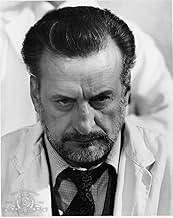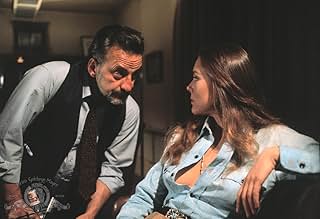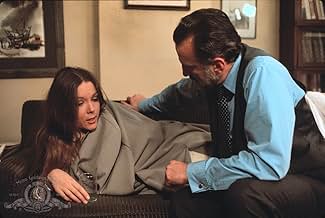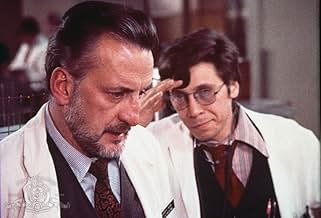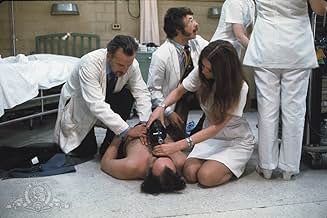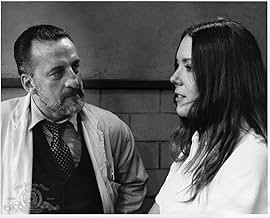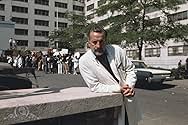NOTE IMDb
7,1/10
7,8 k
MA NOTE
Ajouter une intrigue dans votre langueA hospital's chief-of-staff struggles to find meaning in his life during a spate of staff deaths.A hospital's chief-of-staff struggles to find meaning in his life during a spate of staff deaths.A hospital's chief-of-staff struggles to find meaning in his life during a spate of staff deaths.
- Réalisation
- Scénario
- Casting principal
- Récompensé par 1 Oscar
- 7 victoires et 5 nominations au total
Richard Dysart
- Dr. Welbeck
- (as Richard A. Dysart)
Avis à la une
A hospital chief deals with a crisis while battling his own demons. This satire exaggerates situations to drive home its points, but it's a worthwhile black comedy. As with most of his films, Cheyefsky seems more interested in hitting his targets and pontificating than in telling a good story. The Scott character is similar to the William Holden character in "Network," a man with a failing marriage and suffering from menopause who has a chance to rekindle his manhood with a younger woman. Scott is quite good in conveying the middle-aged weariness and bitterness. Rigg is also fine as a hippie, but their instant love affair is not believable.
Read a biography of the late George C. Scott and you'll discover why he was so enormously talented. He was asked by an interviewer what his secret was when making each character he played his own. Scott replied, he possessed inside him a burning fire which drove him. In one of his last interviewers, he sadly revealed he had lost the drive. This was not the case when he starred in the movie, "The Hospital." In this offering, he plays talented doctor Bock, medical director of one of the finest hospitals in the country. However, life has dealt him some crippling problems, such as losing his wife to a divorce, becoming alienated from both his promising children and worse of all, believing himself to be physically impotent. At this point, he is now becoming complacent, morose and frequently fantasizes various ways of committing suicide. To add to his growing list of personal obstacles, his main reason for being, his hospital has come under siege by students and neighborhood protesters, incompetent doctors like Dr. Welbeck (Richard Dysart) and a mysterious MD. who is killing both patients and doctors alike, because he believes he is "the Wrath of the Lamb." (Barnard Hughes). Few choices are left to Bock. One is promising doctor Brubaker (Robert Walden) whom he confides in by saying, "If there were an oven around here, I would put my head in it." The second is a luscious young woman, named Barbara who is attracted to Bock because he acts like a wounded bear. Paddy Chayefsky wrote the screen-play and Arthur Hiller did an extremely good job of directing this dramatically interesting, dark story, but a vehicle nonetheless, lit by the fire of George C. Scott. ****
Anyone who has spent time working in a hospital or medical facility has got to appreciate this film. The plot is absolutely wild but entertaining from start to finish. The acting is superb. George C. Scott is the brilliant doctor but class A failure as husband, father. Diana Riggs, a sex symbol of the 1960s and 1970s (of The Avengers), saves him from himself. The surrounding cast is superb and the dialogue quite entertaining. I think I enjoyed the film more on viewing it the 4th., 5th. or 6th. time because I caught that much more of the richness of the dialogue and the interplay of the characters. Well worth seeing again and again. You just won't want to check in to a hospital in the near future.
Anybody who goes to the Manhattan Hospital Center is taking his life in his hands. That includes the staff of The Hospital.
I had never seen The Hospital before and I was intrigued at how similar the characters and situations of the plot were to that other Paddy Chayefsky masterpiece, Network. There are elements in George C. Scott's character that have both Al Schumacher's and Howard Beale's.
He's the administrator of The Hospital and he's mad as hell and not going to take it any more. He's completely estranged from his wife and kids. It takes a Faye Dunaway type character in the person of Diana Rigg to make him snap out of it. One roll in the hay with her and he's shocked back to reality and the fact he still can contribute in the world.
But first he's got a real problem. Someone is out killing hospital staff, four of them in a 48 hour period. And the nice part is their deaths can be attributed to in large part to the general incompetence of a medical bureaucracy. That's where the comedy comes in.
There is an actual Howard Beale type character in the person of Barnard Hughes, Diana Rigg's father. His end is not quite as dramatic as Beale's though.
Back in my working days it was part of my job to pay medical suppliers. Some of them could be as big creeps as you'll find portrayed in The Hospital. The black comedy satire had some real bite to it for me.
George C. Scott was nominated for Best Actor, but having won and refused to accept the previous year's Oscar for Patton, he wasn't about to get a second chance. He lost to Gene Hackman for The French Connection. Still his handling of the role is unforgettable.
Try viewing The Hospital back to back with Network and see how many similarities you spot.
I had never seen The Hospital before and I was intrigued at how similar the characters and situations of the plot were to that other Paddy Chayefsky masterpiece, Network. There are elements in George C. Scott's character that have both Al Schumacher's and Howard Beale's.
He's the administrator of The Hospital and he's mad as hell and not going to take it any more. He's completely estranged from his wife and kids. It takes a Faye Dunaway type character in the person of Diana Rigg to make him snap out of it. One roll in the hay with her and he's shocked back to reality and the fact he still can contribute in the world.
But first he's got a real problem. Someone is out killing hospital staff, four of them in a 48 hour period. And the nice part is their deaths can be attributed to in large part to the general incompetence of a medical bureaucracy. That's where the comedy comes in.
There is an actual Howard Beale type character in the person of Barnard Hughes, Diana Rigg's father. His end is not quite as dramatic as Beale's though.
Back in my working days it was part of my job to pay medical suppliers. Some of them could be as big creeps as you'll find portrayed in The Hospital. The black comedy satire had some real bite to it for me.
George C. Scott was nominated for Best Actor, but having won and refused to accept the previous year's Oscar for Patton, he wasn't about to get a second chance. He lost to Gene Hackman for The French Connection. Still his handling of the role is unforgettable.
Try viewing The Hospital back to back with Network and see how many similarities you spot.
It's hard to tell in this scenario. We've all heard about (or maybe even experienced) some quirky stuff in hospitals, but this one (fashioned by Paddy Chayefsky) really takes the cake.
Seldom has there been such an odd assortment of patients, staff and docs under one roof. Agreed some reforms are needed in the medical profession which warrant exposing.
But Chayefsky creates a circus, replete with sexually maladjusted interns, an Indian medicine man performing out-patient rites, and a mad killer stalking the corridors for victims and bopping them over the head. That George C. Scott keeps a straight face must be one of the great acting feats of '71.
The script goes so over-the-top that it gives that term a new meaning. Enough to make one want to cancel their Medicare and go alternative all the way.
Where's that grape seed extract and Noni juice?
Seldom has there been such an odd assortment of patients, staff and docs under one roof. Agreed some reforms are needed in the medical profession which warrant exposing.
But Chayefsky creates a circus, replete with sexually maladjusted interns, an Indian medicine man performing out-patient rites, and a mad killer stalking the corridors for victims and bopping them over the head. That George C. Scott keeps a straight face must be one of the great acting feats of '71.
The script goes so over-the-top that it gives that term a new meaning. Enough to make one want to cancel their Medicare and go alternative all the way.
Where's that grape seed extract and Noni juice?
Le saviez-vous
- AnecdotesWhen Dr. Herbert Bock rants, "We have established the most enormous, medical...entity ever conceived and people are sicker than ever!" the slight pause, searching for the word "entity", was spontaneously ad-libbed by George C. Scott to save the take. The scripted line was, "we have ASSEMBLED the most enormous medical ESTABLISHMENT ever conceived." Scott heard his slip in mid-sentence, so he reworded the line so as to not make it repetitive. Director Arthur Hiller loved the save so much he used that take in the movie.
- GaffesBarbara Drummond says that she lived for a year with the Hopi Indians, but she mispronounces "Hopi" as "Ho-pye."
- Citations
Herbert Bock: I mean, where do you train your nurses, Mrs. Christie--Dachau?
- Crédits fousAlthough Barnard Hughes played two distinct roles, the end credits lists Hughes as playing the role of Drummond but not Dr. Mallory.
- ConnexionsFeatured in Best! Movies! Ever!: Hospitals (2007)
Meilleurs choix
Connectez-vous pour évaluer et suivre la liste de favoris afin de recevoir des recommandations personnalisées
- How long is The Hospital?Alimenté par Alexa
Détails
Box-office
- Montant brut aux États-Unis et au Canada
- 19 711 560 $US
Contribuer à cette page
Suggérer une modification ou ajouter du contenu manquant



